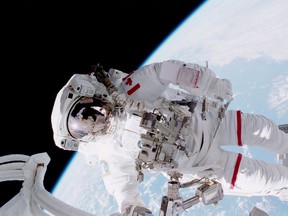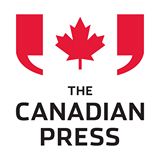Hadfield takes the first Canadian spacewalk 23 years ago: Today in history

Article content
On this date, April 22, in history:
In 1233, the Dominicans were established in France as operators of the Inquisition by a decree of Pope Gregory IX. Their methods included torture and execution, usually by fire. Before long they became popularly known as “God’s dogs.”
In 1509, Henry VIII became King of England. He would reign until his death in 1547, marrying six times and beheading two wives. Under his rule, England broke with Rome and the King became the head of the Church of England.
In 1724, German philosopher Immanuel Kant was born. A large part of his work addresses the question “What can we know?” His answer — our knowledge is constrained to mathematics and the science of the natural, empirical world. He died in 1804.
In 1737, the first iron smelter in Canada was established at Trois-Rivieres, Que.
In 1844, the Bytown Packet, later the Ottawa Citizen, was founded.
In 1864, the U.S. Congress authorized the use of the phrase “In God We Trust” on American coins.
In 1870, Soviet revolutionary Vladimir Ilyich Lenin was born.
In 1889, the Oklahoma Land Rush began at noon as thousands of homesteaders staked claims.
In 1904, American physicist Robert Oppenheimer was born. He directed the research which led to the first atomic bombs in 1945. Oppenheimer lost his security clearance in the ’50s because of his doubts about atomic weapons. He died in 1967.
In 1915, in their first action against the Germans during the First World War, the First Canadian Division faced one of the first recorded chlorine gas attacks in Ypres, Belgium.

In 1930, the world’s great powers signed a treaty at London limiting the size of navies.
In 1944, during the Second World War, U.S. forces began invading Japanese-held New Guinea with amphibious landings at Hollandia and Aitape.
In 1963, Lester Pearson was sworn in as prime minister at the head of a minority Liberal government.
In 1964, the Liberals under Ross Thatcher won a Saskatchewan general election, ending 20 years of CCF-NDP rule.
In 1972, British rower John Fairfax and girlfriend Sylvia Cooke arrived at an island off Australia after rowing nearly 13,000 kilometres from San Francisco.

In 1976, Barbara Walters accepted a $1 million a year contract with ABC News.
In 1983, Stern, a West German news magazine, announced the discovery of 60 volumes of personal diaries purportedly written by Adolf Hitler. The diaries turned out to be a hoax.
In 1990, approximately 200 million people worldwide celebrated the 20th Annual Earth Day. Festivities were held in more than 150 countries. Canadians planted trees, attended parades, listened to concerts and picked up litter. At a Parliament Hill event, author Farley Mowat led the crowd in imitations of wolf howls to protest the slaughter of wolves and other wild animals.

In 1992, a series of explosions in Guadalajara’s sewer system rocked a 20-block area of Mexico’s second-largest city, killing 194 people. The cause was listed as a leak in a pipeline operated by the state-run Pemex oil company.
In 1994, Richard Nixon died at age 81 in a New York hospital, four days after a massive stroke. Nixon resigned as U.S. president on Aug. 9, 1974 over the Watergate scandal.
In 1997, Manitoba declared a state of emergency due to flooding in the southern part of the province.
In 1998, Gwen Boniface became the first woman to head the Ontario Provincial Police, Canada’s second-largest police force.
In 2000, U.S. federal agents seized six-year-old Cuban Elian Gonzalez from the home of his Miami relatives in a pre-dawn raid. Elian had lived with relatives in the months after surviving a boat trip from Cuba, in which his mother and other would-be defectors drowned. The legal and political custody battle between the Miami relatives and Elian’s father in Cuba finally ended two months later, when the U.S. Supreme Court ruled for his father. Father and son returned to Cuba on June 28.
In 2001, Chris Hadfield became the first Canadian to walk in space. Hadfield and an American colleague on the space shuttle Endeavour crew unfolded and installed an updated model of the Canadian-built robotic arm that would help build and maintain the International Space Station.

In 2003, the RCMP did not lay any charges after concluding an eight-year, multi-million dollar investigation into allegations of improper payments to former prime minister Brian Mulroney and a number of his political cronies in connection with Air Canada’s purchase of 34 jets from Airbus in 1988.
In 2004, two trains loaded with fuel and chemicals snagged overhead electricity cables and exploded in a North Korean railway station in the town of Ryongchon, killing at least 161 people, including 76 children, and injuring at least 1,300. The explosion damaged more than 8,000 buildings.
In 2004, sex abuse victims were awarded nearly US$70 million after suing part of the Evangelical Lutheran Church in America.
In 2004, NFL player Pat Tillman, who’d traded in a multi-million-dollar contract to serve as an Army Ranger in Afghanistan, was killed by friendly fire. He was 27.
In 2005, Moroccan-born Zacarias Moussaoui pleaded guilty to terror charges related to the Sept. 11, 2001 attacks in the United States, but said his real goal was a separate plan to crash a Boeing 747 jetliner into the White House. At his sentencing hearing in March 2006, Moussaoui admitted that he was supposed to fly a fifth plane into the White House along with would-be shoe bomber Richard Reid.
In 2006, a roadside bomb killed four Canadian soldiers north of Kandahar in Afghanistan. It was Canada’s worst one-day combat loss since the Korean War.
In 2009, South Africa’s long-dominant African National Congress won overwhelmingly in parliamentary elections, but did not get the two-thirds of the vote it won with ease in the last elections.
In 2009, rules banning the sale and cosmetic use of about 250 pesticides, including 2,4-D and malathion, came into effect in Ontario, the toughest pesticide ban in North America.
In 2009, Ontario became the fourth province to enact a ban on the use of hand-held devices to talk, email, or send text messages while behind the wheel.
In 2009, Canadian diplomats Louis Guay and Robert Fowler, kidnapped in Niger, Africa, were freed in neighbouring Mali after four months in captivity. Al-Qaeda had claimed responsibility for their abduction.
In 2010, the British Petroleum-leased Deepwater Horizon offshore oil platform sank into the Gulf of Mexico after burning violently for nearly two days caused by a massive explosion from a methane gas bubble. Eleven workers were killed in what turned out to be the biggest offshore oil spill in U.S. history.
In 2013, Canadian residents Raed Jaser and Chiheb Esseghaier were arrested and charged for allegedly planning to attack a passenger train that travels between the U.S. and Canada in what the RCMP called the first known al-Qaida directed plot in this country. (In March 2015, Jaser and Esseghaier were found guilty.)
In 2016, leaders from 175 countries, including Prime Minister Justin Trudeau, signed the Paris Agreement on climate change in New York on the first day it was open for signatures. States that didn’t sign had a year to do so.

In 2018, an Islamic State suicide bomber carried out an attack at a Afghanistan voter registration centre in the capital Kabul, killing 57 people and wounding more than 100 others.
In 2018, a gunman wearing only a green jacket and brandishing an assault rifle stormed a Waffle House restaurant in Nashville, shooting four people to death before a customer rushed him and wrestled the weapon away. The suspect fled and was arrested the next day after a police manhunt.
In 2020, U.S. President Donald Trump announced a temporary suspension of immigration to the country. Trump said the 60-day pause on the issuance of green cards would limit competition for jobs in an economy wrecked by the novel coronavirus.
In 2020, Nova Scotia court records confirmed the gunman who killed 22 people on April 19th was ordered to undergo counselling for anger management after he pleaded guilty to assaulting another man in the Halifax area in 2001. As part of his sentence, Gabriel Wortman was prohibited from owning or possessing a weapon, ammunition or explosive substances.
In 2020, after weeks of resisting calls for widespread testing of asymptomatic people, Ontario health officials expanded COVID-19 testing to every resident and worker in long-term care homes.
In 2020, Canada’s COVID-19 caseload surpassed 40,000.
In 2021, Ontario Premier Doug Ford admitted his government got it wrong when it gave police power to stop and question people for being out of their homes during the pandemic. Many police forces refused to enforce such a measure, and it was eventually scrapped.
—–







Postmedia is committed to maintaining a lively but civil forum for discussion. Please keep comments relevant and respectful. Comments may take up to an hour to appear on the site. You will receive an email if there is a reply to your comment, an update to a thread you follow or if a user you follow comments. Visit our Community Guidelines for more information.